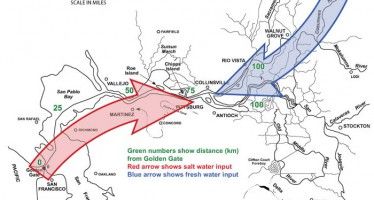CA jobless down, but state faces competition

 California took pride this week in the staggering news of Apple Inc.’s record quarterly earnings. And the state unemployment rate dropped in December to 7 percent, down from 7.2 percent in November — a vast improvement over the 12 percent of 2010 and 2012.
California took pride this week in the staggering news of Apple Inc.’s record quarterly earnings. And the state unemployment rate dropped in December to 7 percent, down from 7.2 percent in November — a vast improvement over the 12 percent of 2010 and 2012.
But a glance to the future — and behind the numbers — shows the state economy faces numerous question marks. Among the 50 states on the new data from the Bureau of Labor Statistics, California now is second-worst, behind only Mississippi at 7.2 percent. “Better than Mississippi!” would not make a great slogan.
Since the Great Recession, Nevada and Rhode Island have suffered unemployment even worse than California’s. But for December, both posted 6.8 percent jobless rates.
Not to mention the rate of California’s top competitor: Texas at 4.6 percent.
There also are some worrisome details about California. “Most of the December 0.2 percentage-point drop was from more people leaving the group that is ‘actively seeking work,'” Richard Rider told CalWatchdog.com; he’s the chairman of San Diego Taxfighters. “We can see this in the fact that during this rather dramatic drop, only 700 net new jobs were created in a state of over 38,800,000 people.”
He added that today more people than in the past are working part-time, “yet we count anyone working as little as 1 hour a week as ’employed.'”
He pointed to a new report from Advisor Perspectives, a publication for investment advisors. Looking at national numbers provided by the BLS, it found:
“The Labor Department has been collecting this since 1968, a time when only 13.5 percent of U.S. employees were part-timers. That number peaked at 20.1 percent in January 2010. The latest data point, approaching five years later, is only modestly lower at 18.7 percent last month. If the pre-recession percentage is a recovery target, we still have a long way to go.”
Competition
Again looking to the future, California is facing increasing competition for businesses and jobs from other states. Writing yesterday in the Wall Street Journal, Heritage Foundation Chief Economist Stephen Moore looked at the trend for tax cutting:
“as many as 20 Republican governors are moving forward with their own pro-growth tax-relief initiatives. This is on top of the 14 states, including Florida, Michigan, Ohio and Wisconsin, whose 2014 tax cuts will take effect this year.”
So that’s 34 states cutting taxes — even as California continues under the the $7 billion tax increase of Proposition 30, which voters passed in 2012. It boosted the state’s top income tax rate to 13.3 percent, the highest of any state.
Even depressed Mississippi is getting into the act. Reported Mississippi Public Broadcasting on Jan. 22, “Governor Phil Bryant is calling for a tax cut for thousands Mississippi families. Bryant addressed a joint session of the Mississippi Legislature last night for his state of the state address.”
Rider, who has been analyzing California tax policy for decades, gave his perspective. “States are cutting taxes because they understand economic competition,” he said. “The evidence is overwhelming that lower taxes and more reasonable regulation results in more jobs and a more prosperous state. California leadership is still in denial of this Economics 101 reality.”
He also pointed to a fact sheet he compiled of state per-capita GDP numbers. California’s nominal number in 2012 was 18th highest of the 50 states and D.C., at $46,029 per capita.
But when cost-of-living is taken into account, it dropped to 39th, at $36,215.
Blue-state tax cuts
Moore points out that even Blue States are getting into the tax-cutting act: “In Illinois, Maryland and Massachusetts — three blue states that elected Republican governors in November — tax rates are likely to fall to provide juice and jobs for local economies.”
If Mississippi cuts taxes and unemployment drops fast, California could be left holding the bag of the worst unemployment rate among the states.
Rider believes things will change in California only after a crisis. “Meaningful reform will come only out of necessity, not from some change of heart,” he said. “It will take years before we reach that point — we are not in a collapse — just a stately decline.”
Related Articles
Brown cuts down size, scope of water bond
Would half a water bond sell better to voters than the full $11 billion bond scheduled to be on the
National City Eminent Domain On Ropes?
MARCH 21, 2011 By WAYNE LUSVARDI Just as State Assembly Republicans were pulling their punches to keep eminent domain alive for
Yes, we can break public-employee pensions
First on a series on public pensions. Sept. 20, 2012 By Mark Cabaniss The politicians in charge of “doing something”



